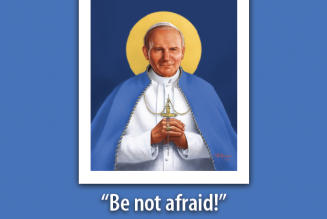
While Lent offers us a clear path of conversion, turning away from the world, Easter invites us into God’s own life. In Lent, we seek to die with Christ; in Easter, we must live with him. It appears an anticlimactic season after the rigors of prayer and fasting, but Lent is ordered to Easter as a period of training to live a more joyful and integrated life in Christ.
The word “chastity” might take us right back to the battle of Lent. Isn’t that one of those negative words focusing on prohibitions? The Church’s teaching, however, leads us to a positive vision focused on integrity: “Chastity means the successful integration of sexuality within the person and thus the inner unity of man in his bodily and spiritual being” (Catechism of the Catholic Church, §2337). This vision focuses more on life than death, living a truly human life that allows the interior order of the soul to God to permeate our entire being.
The word chastity, therefore, needs to be resurrected in our understanding. Bishop Erik Varden, former Trappist Abbot of Mount St. Bernard’s Abbey in England and now Bishop of Trondheim in his native Norway, offers a glorious revivification in Chastity: Reconciliation of the Senses (Bloomsbury, 2023): “To tie chastity down, as has been done, to mere mortification of the senses is to make of it a tool to sabotage the flourishing of character. It is also to misunderstand, misrepresent, and misapply the meaning of a complex notion. I hope, in this book, to release ‘chastity’ from imprisonment in too narrow categories, allowing it to stretch, extend its limbs, breathe freely, perhaps even sing. I use these images advisedly. Unless chastity has a degree of full-bloodedness, it is not a real thing, but counterfeit” (10). We must resurrect chastity, not simply as a term but as a source of the Lord’s risen life within us.
Varden brings delight to an area most seek to avoid, bringing light and joy into a serious conversation about inner disorder. He illuminates chastity through art, drama and literature while remaining down-to-earth. The book speaks to real human experience more than offering a scholastic treatise. Touching on this point, he explains, “That is why I am keen to ground my reflection on chastity in the narrative of a dignified substance divinely adorned, then stripped of glory, reduced to a state of confused desire, ever wanting more than earthly life can provide yet able, even among thorns, to know moments of exultant joy, proceeding homeward – whether or not one knows where home is – robed in mercy” (46). What an elegant tribute to the work of the Resurrection to restore us to glory.
My largest takeaway from the book regards the way in which chastity fulfills our nature rather than diminish it. He continues where the last quotation left off: “Leaning on this narrative, deeply Scriptural, I will suggest that the wholeness to which a chaste ideal would lead is not contrary to nature but stands for nature’s fulfillment. It is an ideal sprung from our gracious origin and pointing towards our supernatural end. The pursuit of integrity is rarely straightforward. It can take us through momentous tensions, which we shall consider. Still, it is a vital option, an option that stands a good chance of bringing happiness. In the language of Deuteronomy, it stands for a choice of life, not death” (46-47).
Varden does not shy away from the tensions that express our often twisted search for happiness. He does not simply condemn them but looks upon them in light of the goodness of our nature and the light into which God calls us. We need to recover a sense of our identity, of what it means to be human. “We do not, in fact, know what is natural to us. Therefore we struggle to live naturally. . . . What is natural is to be governed by the Word, and thereby to know, in God, freedom, harmony and joy” (52-53). The rejection of chastity and the integration it brings leads only to emptiness and death, not joy and life, while God’s grace restores dignity to our humanity.
The book does not shy away from challenging topics related to sexual disorders, but examines them with gracious honesty. When discussing the “dehumanizing eros” that consumes others, he explains its perversion as “‘turned away’ from its purpose. Instead of creating communion, it accentuates loneliness. That is why it must be dealt with sensitively” (98). The Christian, in overcoming distorted eros, turns to asceticism to find the freedom needed to commit to others, to see things as they really are. “Chastity enables us to live thus, attentively and reverently. It stands for a way of being alive in the world” (157). We can choose chastity as a path to life, enlivened by the grace of the risen Christ, the one who came into the world to overcome darkness and sin so that we may embrace the fullness of life.








